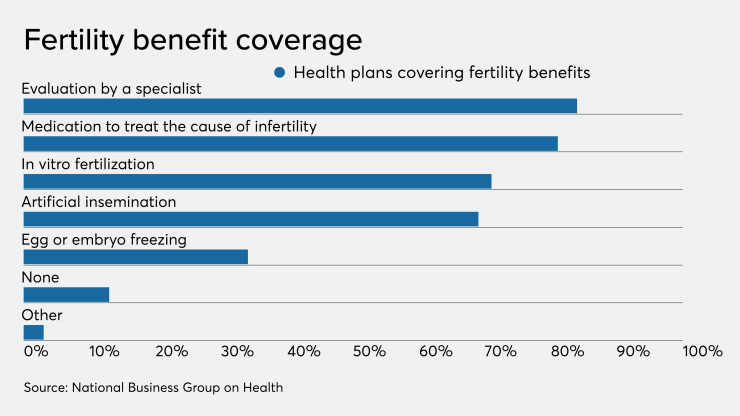Fertility benefits management company WINFertility has teamed up with international law firm Akin Gump Strauss Hauer & Feld to offer all the firm’s U.S. employees benefits that assist with
Only 19% of employers currently offer an in vitro
These often prohibitive costs mean that employees are placing a high premium on benefits like IVF, egg freezing, surrogacy and adoption support. Sixty-eight percent of employees said they would switch jobs for fertility benefits, according to a study by fertility clinic Reproductive Medicine Associates.
“Like so many other employers, [Akin Gump] had been hearing from employees that there’s just greater demand for [fertility benefits],” says Peter Nieves, chief commercial officer at WINFertility. “IVF cycles are increasing in our country as a result of employees — millennials in particular — waiting to start their families later in life.”
Read More:
The law firm will provide adoption benefits and surrogacy benefit coverage, along with 24/7 support from nurse care managers, who can offer recommendations and referrals throughout the process. Additionally, employees will have access to the WIN for Him program, which provides male fertility support.
While infertility is often seen as a woman’s issue, the rates of infertility among women (11%) and men (9%) in the U.S. are fairly close. The WINfor Him program helps male employees understand the issue and feel comfortable enough to get the help they need.
Read More:
“Male infertility is increasing to the point where almost half of all infertility cases that couples are facing are driven from the male side,” Nieves says. “Men are reluctant to be tested in clinics and are often in need of emotional or behavioral support.”
The pandemic has highlighted the need for employers to make greater investments in benefits — beyond salary and healthcare — that support an employee’s overall well-being. Fertility benefits can play a key role in attracting and retaining talent, while also keeping employees’ productivity on track and saving employers expensive healthcare costs.
“I’ve been there myself and you get very distracted by the fertility journey,” Nieves says. “The proper guidance can get you to the best doctors, help you make better choices and help you build your family faster. There’s a lot of benefits for the employer, including [reducing] unforeseen costs, as well as [increasing] the productivity of their employees.”






